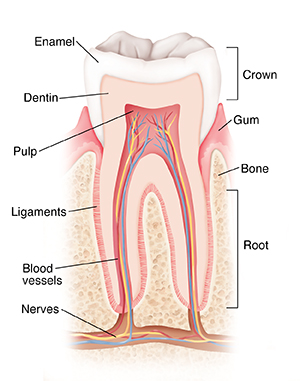Understanding Healthy Teeth and Gums
When you look at your mouth in the mirror, you can see hard white teeth surrounded by soft gums. What you likely can’t see is a sticky coating of bacteria and other substances on your teeth and gums. This coating, called plaque, can harm your mouth if it’s not kept under control.
Healthy teeth and gums
To have good oral health, you must have healthy teeth and gums:
-
Teeth are made of hard tissue designed to break up food. Healthy teeth can be many shades of white (some staining on the teeth is normal). Teeth are set into the supporting bone of the jaw.
-
Gums are soft tissues that cover bone and part of each tooth. The color of your gums depends on your ethnicity. Racial pigmentation may or may not be spread evenly throughout the gums. This is normal.
-
Enamel is a hard coating that protects the surface of the tooth.
-
Dentin is the middle layer of the tooth.
-
The pulp is the soft inner tissue of the tooth.
-
Ligaments are tiny fibers of connective tissue that attach the root to the bone.
-
Blood vessels carry nutrients to the tooth.
-
The crown is the part of the tooth you can see. It has surfaces used for biting and chewing.
-
Bone in the jaw provides support and stability.
-
The root is the part of the tooth that is lodged in the supporting bone.
-
Nerves relay signals, such as pain, to and from the brain.

When plaque and tartar form
Even in a healthy mouth, plaque forms. If not cleared away with daily brushing and flossing, this sticky film coats the teeth, gums, and tongue:
-
As saliva and the tongue move in the mouth, some plaque is wiped off the tooth surfaces. But plaque can collect in the grooves of the teeth, between teeth, and at the gumline.
-
Plaque bacteria feed on bits of sugary and starchy foods left in your mouth after you eat. This results in acid, the main cause of tooth decay.
-
If not removed, plaque hardens into tartar. Tartar can spread below the gumline, where it damages the gums and bone.
Are you at risk?
Some factors make you more likely to have problems with your teeth and gums. These include:
-
Not taking good care of your teeth and gums.
-
Having a low amount of saliva in the mouth, which allows plaque to collect.
-
Smoking, which makes your body less able to fight infections like gum disease and also reduces the amount of saliva in your mouth.
-
Eating a lot of sugary and starchy foods, which causes more acid to form.
-
Frequent snacking, which lets acid form more often.
-
Having crooked teeth, which can be harder to clean.
Your dentist can help you keep your teeth and gums healthy. Talk with them about resources to help you quit smoking, if needed. Have them show you the best way to keep your teeth clean. And make sure you see your dentist regularly for cleanings and checkups. They can address any concerns you have.
Online Medical Reviewer:
Daphne Pierce-Smith RN MSN
Online Medical Reviewer:
Mahammad Juber Medical Researcher
Online Medical Reviewer:
Raymond Turley Jr PA-C
Date Last Reviewed:
2/1/2025
© 2000-2025 The StayWell Company, LLC. All rights reserved. This information is not intended as a substitute for professional medical care. Always follow your healthcare professional's instructions.